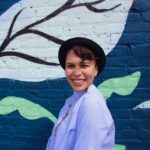 When you scroll through Apple Podcasts, Spotify or any podcast application, you won’t see any Generation Z-produced shows dominating the charts — even though Americans aged 12 to 24 were the key demographic that increased in listenership this year, surpassing the previously largest group of 25-34 year olds.
When you scroll through Apple Podcasts, Spotify or any podcast application, you won’t see any Generation Z-produced shows dominating the charts — even though Americans aged 12 to 24 were the key demographic that increased in listenership this year, surpassing the previously largest group of 25-34 year olds.
There is a huge need to fill in various gaps in the audio world: the voices, experiences and production skills of Gen Z, millennials, people of color, trans and non-binary identifying people, immigrant, first-generation Americans, and people with disabilities. Efforts have been made to disprove the often-made claim of “we just can’t find any diverse people to hire.”
At the 2018 Third Coast Festival, an annual audio conference hosted in Chicago, a multidisciplinary artist and freelance producer named Phoebe Wang used her acceptance speech for the Best New Artist award to call out the whiteness of the industry. This led to Wang, along with a group of four other audio producers — Adizah Eghan, Zakiya Gibbons, Aliya Pabani and Afi Yellow-Duke — to build a directory of people of color in the audio world. Martina Castro, founder of Podcasteros, wanted to bring together the Spanish-language podcast community and has created a talent directory, newsletter, ambassador program and webinar program that has a global reach. Berry Syk, creator of Podcasts In Color, has been gathering all podcasts created by people of color and made a directory of categories. These are just some of the formalized efforts initiated, led and maintained by the same people who are usually the only diversity on their teams and do unpaid recruitment and hiring tasks.
This is the current state of the podcasting industry and while much of the focus has been on the racial and ethnic aspects of diversity, as a graduate of Emory’s Rollins School of Public Health, I want to incite Emory students who are interested in exploring podcasting to dive in. There is a huge need for Generation Z to express their opinions, share their experiences and root the rest of the world in their realities. Especially if you self-identify with any of the identities that the industry is lacking. I’ve asked myself many times, “But who cares about what I have to say?” and, “I am not an expert so let me graduate and get this degree first,” or even, “I am not ready to share my voice with the world.”
I get it. But my response is, do it anyway.
Youth and people with intersectional identities are drivers of society with immense power, value and creativity. Despite the messages that we are told, it is undeniable that the world we are about to inherit can and should be shaped by us. I’ve witnessed the confidence of basic people with basic ideas pursuing their dreams and getting support at all levels. So, why not you?
Once you step outside the bounds of the college community, you will have to unlearn the academic habits you created to survive and get to graduation day. You will have to learn new ways to communicate with people in accessible and relatable terms. You’re going to struggle finding your voice and your place as you adjust to the new chapter in your life. I believe podcasting can be that creative outlet where you put it all into practice. But you don’t need to wait until graduation because the podcast industry is growing daily and thousands of people are uploading their new shows to Apple every day. The audio world may not have recognized you and your voice as an asset just yet, but I am here to tell you that you are a treasure and we can’t wait to hear you on the audio waves.
Isabeth Mendoza (18P.H.) is a bilingual independent audio producer based in her hometown of Southeast Los Angeles, Calif., working on ways to bridge audio, health and social justice across borders.
Isabeth Mendoza is a bilingual independent audio producer based in her hometown of Southeast Los Angeles, Calif., working on ways to bridge audio, health and social justice across borders.



